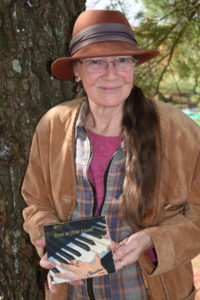blair garrett
“On The Wild Side” provided a fun and exciting glimpse into what nature had to offer. Getting back to our roots in nature was a major focus for Christine Maccabee, Catoctin Banner columnist, as she waves farewell to writing for the Banner and moves on to other exciting ventures.
Maccabee’s final “On The Wild Side” column detailed the importance of seed-saving, a centuries-old tradition for re-planting crops, flowers, and just about anything else that grows out of the ground. She has routinely developed stories on her experiences with gardening and environmental health during her time with the Banner.
Maccabee is a creative soul who has written for the Banner for years, often exploring and explaining the value of nature and environmental crises surrounding our earth.
She got her start in writing many years ago and, to date, has covered anything from gardening tips, to humans’ impact on water, to climate change and its effects on our world.
“I was journaling throughout college,” Maccabee said. “I was always sort of a poetic person, but in my 20s was when I really got fired up and started writing a lot of nature songs.”
Maccabee is an avid songwriter and poet, which has contributed greatly to her writing over the years. Her articles were often thoughtful and informative and written with a down-to-earth tone, making them easily relatable to anyone with even the slightest interest in the outdoors.
She got her start in published long-form writing with a former local newspaper, and her ideas have flourished from there.
“I started off with the Emmitsburg Dispatch, writing about my goats,” Maccabee said. She talked about her experiences milking them, their attitudes, and all of the joys goats brought her.
“I’ve been very thankful that the Banner took me on after Bo Cadle at the Dispatch. I segued from goats to gardens.”
Though she no longer has goats, her garden has taken off since her days of writing for the Dispatch. Annually, Maccabee grows peas, garlic, potatoes, various berries, and much, much more. Her repertoire of knowledge for the plant life on her 11.5-acre property has grown tremendously over the years.
“I can identify every single wild plant here, and I’ve been working on that skill since my 20s,” she said.
From gardening to music, Maccabee has always filtered her life through her various creative outlets. She’s made CDs of her songs, countless poems, flora press artwork, and she wants to continue expanding her works to a greater audience.
With so many different focuses throughout her life, Maccabee’s gardening has been a steady source of happiness, personal growth, and inspiration for her.
“Your life is like a book,” she said. “You have chapters, and I’ve done a lot of things in 15-year chapters in my life. But gardening has been a constant throughout that.”
If her music career takes off, or her poems strike a chord with the new generation, you’ll likely still find Maccabee plugging away in her garden or awaiting the blooming plants of the coming seasons. Her deep love of nature will always keep her “on the wild side.”
You can find archives of Maccabee’s “On The Wild Side” articles online at www.thecatoctinbanner.com.

Christine MacCabee sits in her meditation section among her various species of plants.

 Deb Spalding
Deb Spalding